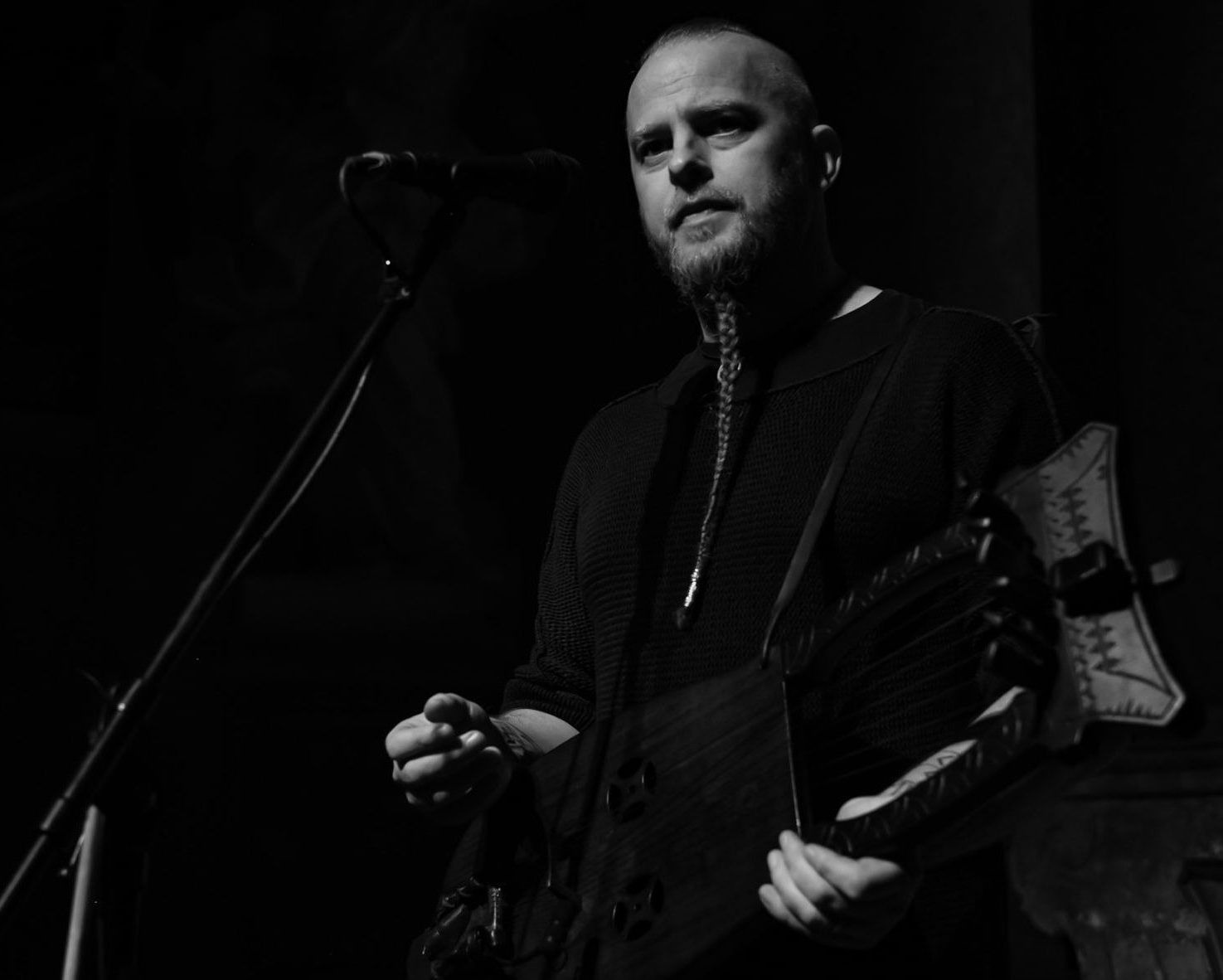
„I don’t like the word viking. It defines our culture with a verb,“ says the musician Einar Selvik
6. 1. 2020
The main leitmotif of AFO54 was a myth. Famous Norwegian musician Einar Selvik returned to AFO. The founder of the folk project Wardruna and the author of the music for the Vikings series talked with us about his work as well as about our festival or the importance of myths in today’s world. “From myths, we need to take what is relevant to our society,” Selvik says.
How did you get familiar with old myths? When I was younger, my mother used to read me for example Greek myths before I went to sleep. How it was in your case?
It was also through the people from my family who were interested in these myths and in history in general. Every time we went to a vacation I heard these stories. At the time, I merely enjoyed it, not much reflected it. Later, in my early teens, when I discovered my own interest for it, I understood that lot of these images, this sense of time and history in my landscape, had given me some very strong images which stucked. So yes, it has very much been the part of my childhood as well. The stories were just there. I think it is a healthy way how to get familiar with it. It wasn’t thrown on me or something like that, just natural thing.
Northern myths are closely connected with history. Do you think, that they can to a certain extent function as a replacement for lectures of history? As more comfortable way of learning history?
Saga is something like a fairy-tale written by scholars, about kings, rebels and so on. This is a perfect way of learning history. Thing that we lack today is the sense of honor, how to behave towards other people. We adapt this warrior mentality – us against them, my god is stronger than your god, my culture is better than yours. If you go back to old days, tradition surrounding honor was so heavily implemented that not acting honorably could actually get you killed. Especially according to need of respecting your enemies. It doesn’t matter if you disagree, you act in an honorable way. That’s what I wish for all the people fantacizing nowadays about being vikings again – to pay attention more to these things. In my work, I do not romanticize the past, I do not believe, that it was so much better back then, that the people were so much smarter than us. Yes, they were smarter in some things and we are smarter in others. It’s not about copying the past, but about taking some of it. We can’t go around and do things just because they did it. In my work, this has always been the essence. Some things resonate, but lot of things are just not relevant anymore. The same goes for the myths. Lot of them still apply. They are born out of nature and nature still surrounds us. Only we romanticize the nature nowadays. And they did not. They fought nature to survive. That is also in the myths – nature is the wild, untamed. And we need to achieve the control and cultivate it. In our times we need modern views on traditions, because we have different needs. Therefore, myths have totally different meaning today. But the essence, the wisdom is the same.
There is a certain kind of nostalgia in our way of seeing the past and the nature.
Yes, and I think it’s very unfruitful. At least not to have a consciousness around it. In some parts it makes sense to have a nostalgic feeling around them, but in others definitely not.
How popular are your myths in for example contemporary Norway? Are the children aware of them well or is this tradition more floating away?
Up until recently it almost disappeared. That is because after the World War II. Nazis misused our traditions and mythology, it became really contaminated and untouchable. You could have seen total disappearance from literature, theatre, films. When I was learning about this in school, it was basically impossible to take it seriously. Gods were demonised and there was very much added colours. It’s understandable because our history is fragmented mixture of pieces. And also it is far more complex way of seeing the world than we have today. The idea of cyclic thinking, non-linear perception of time, is very hard to imagine. There was no black and white thinking, no gods or goddesses that would be just good or just evil. It was more interactive. This complexity stands behind my interest for it. In Norway, it was almost untouchable thing, not easy to approach. When I started with Wardruna, it took a while until people saw that my approach was serious and did not have a political agenda. What we see now is enormous pressure of interest we’re getting. Which actually makes people aware of their history.
All the stereotypes that we’ve been fed all the time – that our ancestors were just barbarians – are beginning to dissolve. There is a good reason why I never use a word „viking“ in my communication. I don’t like it. The fact that you define culture lasting for thousands of years with a verb. Because viking is not something you were. It’s something that some people did for a very short period of time. Go viking can mean exploring, raiding, trading, an adventure in a sense. Defining culture on a verb that only applies for small amount of time is fundamentally wrong. It is time to nuance this. That’s one of the things that I do like about this massive interest. For instance TV show Vikings contributes to the effort of nuancing some of assumptions and stereotypes connected to our history. It helps us to take back our history from the political misuse. Good things are happening in that sense.

Recently I have read Norse Mythology from Neil Gaiman, do you know this book?
Yes, I know it, but I haven’t read it yet.
Gaiman has an interesting approach towards telling myths. In the pre-word he says, that he has not used any archive materials, but he is re-telling old myths in the way he remembers it from childhood. Do you thing this is the right approach?
You have to remember, that whenever you hear or read one of these stories or poems, you were never supposed to read it. This is oral culture. Lot of these poems have many different versions. The same goes for collecting songs. People collecting them heard the song, took it back home and reproduced it in the way they remembered it with the structure slightly different. Also you have to remember the missing context. We were supposed to experience it. Take longhouses for instance. Longhouse represents a micro-cosmos, space was also used actively as a sort of stage to tell stories, sing songs. We can consider it as a ritual. So I totally agree with this approach. It’s a healthy. And it makes the stories alive. You’re not treating them as a dead thing. This is what I do with Wardruna, I’m retelling it, not copying it. It’s easy to put on a fancy costume and just recycle your favorite north poem. What’s difficult and challenging is to take the wisdom beneath words, traditions behind them and create new songs, new stories. That’s what fuels me.
When you create your own music, or music for the TV series Vikings, where do you get the inspiration and where is the point when you leave the tradition behind and try to put something new into it?
To start with the music from Wardruna, it’s always hard to work with interpretation of runes. They have many different symbolic values connected to them. My approach has been in trying to interpret those things. For instance, if I work with the rune for the birch tree, I go out to the forest and try to implement nature around me into the music. Or standing in the middle of the river, trying to capture sound of water. These are easier things. But also there are the states of mind, health and many things which can be important to replicate. In a way you can say that the runes were the composer and I was just the instrument. In my approach to the older instruments, I was very determined in one thing when I started out researching, in the time when hardly anyone knew how to use them anymore. I wanted to approach it like a child. To get the instruments chance to find their own voice before I start to put my own inspiration there.
One of my advantages, why many scholars are acknowledging how I work, is that I approach things both academically, as a musicologist, and also as a musician, human. I always say – you can‘t start climbing on a tree which doesn’t have any roots. Then you will fall. That’s why I always try to build on the solid ground. Start out finding out how we know what we think we know about these things, with the facts. And about Vikings, the decisions are not entirely up to me, I only have a part of the music. But I try to find relevant poetry from the sagas of Ragnar or others with relevance and put it into it. Only handful of people is able to detect what I’m actually doing but I believe that subconsciously you will know the difference. It is there and it inflicts you. The only way of reaching the heart is by performing from the heart.

How much have you used older musical instrument when composing music for Vikings?
I used it in many ways. But I was collaborating with Trevor Morris who was the main composer. His approach is different, so sometimes I had a blank sheet to built most of it and he added some of his touches. And sometimes he created the atmosphere where I put my stuff on the top of. Primarily I work with the scenes where somebody sings, when there is a ritual, battle cry or something. I try to find relevant poetry for funeral songs and stuff like that, which is certainly interesting. You have to imagine how it would sound from gathering the stuff we know of how it should be performed. Some things are historical but the art of performing has a set of rules which are timeless and universal. Those things still apply. Any performer in any point of time does and cultivates what works on the audience, you basically feed on their reactions. If I tell a bad joke tonight, I won’t do it next time. You cultivate only what works. Luckily I had the opportunity to perform in the long-houses in front of the audience that was hungry for these stories. I’ve been lucky enough to try out lot of these hypotheses. In a hail or fail way.
During the shooting of Vikings, were you present on the set? Were there some immediate consultations about the music during the shooting itself?
I was on the set twice, every time when I was also performing in front of the camera. They also have their own music team. Unfortunately, I would say, in terms of historical accuracy, and I don’t mean to criticize the show, but it has many different directors and I noticed that some of them were more interested in historical correctness than others. Sometimes I was a little bit frustrated about this, because I think it would be more interesting to break up with this standard Hollywood-like thinking that underestimates the audience.
So main approach with the Vikings is the way in which you get the material, you watch it and then you compose?
Yes, the normal way of doing it is that all the producers have meetings, they go through the episodes and musical department creates temporal music score, suggestions. Then they might send me few of these scores and I work on them. Sometimes they have strong opinion on how it should sound and sometimes you get a time slot and „do-something“ command. Working with the heavy deadlines is actually challenging to me. I work with the acoustic instruments which are very demanding, have a will of their own. So yes, time is challenging especially at the beginning. But I actually think that the idea of inspiration coming to you when sitting under an oak tree is very romantic one. Deadline can be very inspiring. It will push you to your boundaries. A balance I would say is the best. Sometimes it’s good to have a space, sometimes deadline. When you work only in a free space, it demands a lot of discipline.
You were at AFO already in 2015, but this year is a little bit different from the others. More focused on „soft sciences“ so to say, history, media studies, so on and so forth. When you say popularisation of science, most people will probably imagine physics, biology and these kind of sciences. What do you think about this shift?
I have to say that I like it a lot, discussing truth versus history. How truth can be chosen very often, due to political or religious purposes. What is the truth, how history is dictated and written down by winners. Many historical texts have been used as a powerful political tool for thousands of years. This was also an important part of music piece me and Ivar Bjørnson created for 200-year celebration of Norwegian constitution back in the 2014. We took a lot of truths we know are false from our own history and which we still tell to our children in schools, even though we know they are wrong. It was dedicated to address these things. Shaming the false heroes, hailing the truth ones, addressing the faultlessness of our own history as a nation. Looking at ourselves through the mirror of time and debating truth in the history. I think it is very important to discuss these things, because when you see the pattern in the historical perspective, you see these movements and recurring patterns. Then you also understand things which are happening now. You can put it into context. And lot of people fail to see this today. It’s important to address these issues. All honors to the festival which pushes it’s own boundaries and themes. Because we all have to contribute to turn the ship around.
From what you said to me I understand that a lot of this year’s sections like Forgotten history, Origins of art and more could really interest you. Do you have specific programme blocks you look forward to see?
Festival is really hectic, but I hope I will find some time to see a few things. There is definitely a lot of interesting stuff. Popularization is really a good way how to introduce important topics. It seems to me there is too much seriousness and studying. To get money for a study, law states that it supposed to be in common purpose. And it is also stated by law, that scholars have a responsibility to communicate to people all things they figure out. If we take runology, they are studying things that are not in common interest, which won’t lead us any further. They basically gave up an effort to communicate it in the new literature. And I think that Academia has a responsibility of taking all of this knowledge and coding it into the language people would understand.
Nordic studies is going really down the hill recently. I hope this massive interest we see now is going to change it, push people to start showing beautiful things we have on past. They do have relevance. Your roots aren’t important just because they’re your roots. When you know, who you are, where do you come from and have a sense of history, you are not so afraid when you meet other people’s cultures. You don’t feel scared and threatened by it. That is something we need today. When I meet people from other cultures who have strong sense of identity, I have a feeling that they understand me and my culture way better than people who don’t have a sense of history. And people do want to have a sense of history. Maybe that’s why northern mythology is so popular today. We preserved our culture and traditions longer than the rest of Europe and more histories and myths from other nations were born from them, from the nature. One of our biggest mistakes was to take the god out of the nature and put him up in the sky. We need this animistic way of seeing our surroundings. And that was lost in the moment people began to think they have to go into shiny cathedrals to meet god. God is in you, god is in nature. That’s where you find a god.
Text: Tomáš Poštulka
Photo: Tomáš Helísek
Academia Film Olomouc
28. – 3. 5. 2026
61ST INTERNATIONAL FESTIVAL OF SCIENCE DOCUMENTARY FILMS
Follow our social sites and explore our web to find out more about the programme. We will supply you with science dose by dose until the climax comes – AFO61.
Contact
Arts Centre of Palacký University
Academia Film Olomouc
Univerzitní 225/3
779 00 Olomouc
Czech Republic
afo@afo.cz
Quick links
Copyright © AFO 2000-2025 | web rostanetek.cz | admin







